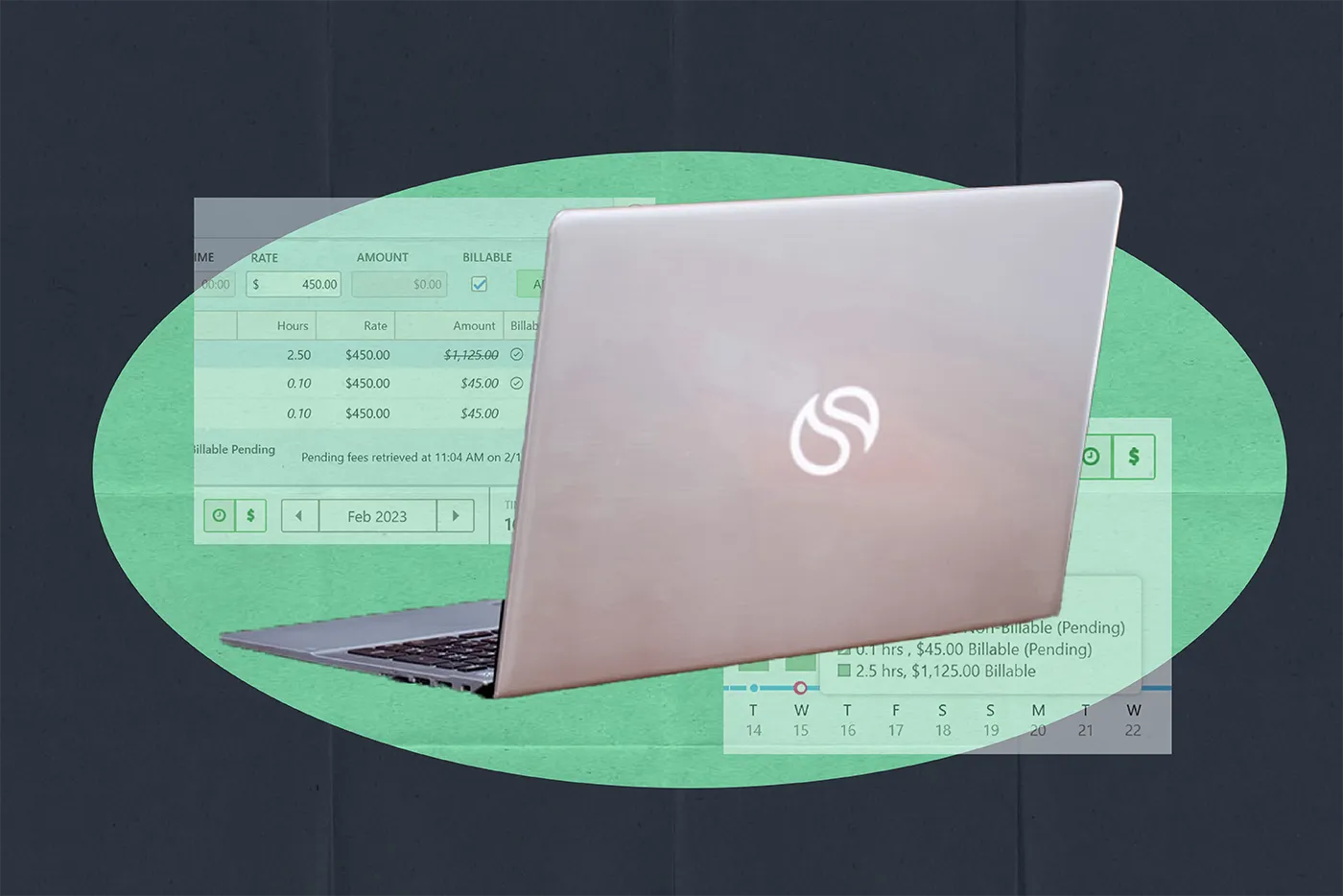Law Firm Billing Guide: All You Need to Know
Written by
|
March 6, 2024
Written by Smokeball
|
March 6, 2024

Written by Jordan Turk
|
March 6, 2024
%20(1).webp)
The success of many law firms hinges on the effectiveness of their billing system and processes. How a law firm bills, how much they bill, and how they process payments can be the difference between just getting by and growing a law firm. But getting law firm billing right can be challenging and even frustrating.
For law firms that don’t have a dedicated department or individuals that handle invoice processing and accounting, the business matters of billing may become a dreaded task. It is often put off by law practice management until the last possible moment. Delayed billing is associated with slower payments and increased delinquencies, which is further challenging.
Fortunately, law firms don’t have to navigate legal billing the way they used to. Legal billing software simplifies and streamlines the process of legal billing, saving time, energy, and sanity.
This article will explore everything you need to know about billing in the legal industry, including legal billing resources available and tools to make your law firm billing procedures easier and more effective.
Chapter 1: Consistent law firm billing policy

No matter how bills are sent, law firms should have standardized billing systems and policies that are consistent across the law firm. A straightforward billing policy keeps everyone at the firm playing from the same sheet of music.
Your billing policy should describe how bills sent to a client should be sent at the same time of the month, should be predictable in appearance and content, and should be an accurate representation of services provided.
Write down your law firm billing process
Start your policy draft by writing down your entire billing process, as if you were disappearing for the next billing cycle and someone else had to follow your instructions in your absence. You’ll want to consider:
- How your law firm accounts for time spent?
- The most important parts of your law firm billing process.
- The most challenging parts of your billing process.
Communicating a billing policy to all of your employees can ensure the accuracy of your billing, which should be a high priority. Other considerations for your billing process are the technical aspects:
- Who needs to review a bill before it is sent?
- How are bills sent (mail, e-mail, delivered through a client portal)?
- What is the process if a bill is not paid?
Finally, have a policy for client billing delinquencies. Unpaid bills should not be neglected for months — your clients are less likely to pay if you do not communicate with them about their delinquency. Your billing policy should explain how clients are reminded about their bills, what options are available for payment arrangements, and when bills are sent to collections.
Create legal billing guidelines for your staff
If one attorney in your law firm writes detailed accounts of tasks and activities and another lawyer accounts for time with short descriptions like “research” or “document preparation” you may lose your client's trust because of your inconsistency.
Your attorney billing guidelines should include sample attorney billing descriptions for common tasks that your lawyers and staff handle. There is no need to reinvent the wheel when describing everyday legal office work.
If you are writing new billing guidelines, provide training to employees and encourage feedback. They may have suggestions based on their experience which may be helpful.
Standardize process for handling law firm billing disputes
Practice law long enough, and a few law firm billing disputes should be expected. Have a process in place for disputes, including:
- Communication acknowledging receipt of the dispute (standard email or letter).
- Person or persons responsible for investigating a dispute.
- Timeframe for responding to the client.
- Possible outcomes for resolving the dispute.
Disputes do not necessarily mean you or your staff did anything wrong - they may be due to misunderstanding and be no fault of your own.
Synchronize the billing process with the financial department
If your finance department is different from your billing department, there should be communications about billing - especially when bills are sent. They should know your billing policy and processes for collections, payment options, arrangements, disputes, and how to handle questions about bills. Your clients will lose trust in you and be less likely to pay if they receive conflicting information from different individuals at your law firm about billing matters.
Chapter 2: Provide clients with professional descriptive invoices

Consider your invoice to be important communication with your client - because it is. Your legal invoice may be paid by someone other than your clients - such as a parent or adult child. Your invoice should make it easy for anyone looking at your invoices to understand the services provided, how to pay the invoice, and when the invoice is due.
Offer an electronic invoice
Most people are used to receiving e-bills and the majority, if not all of your clients, will welcome electronic billing. Providing your client with an electronic invoice either via e-mail or through a portal saves you (minimal) money on postage, but more importantly, gives your client a means of accessing their bill anywhere, and prevents the possibility of losing an invoice.
Include all necessary information
Ditch confusing legalese and long narratives - keep your descriptions short but detailed. Examples of billing time descriptions could be:
- Spoke to a client on phone about a letter received from HOA and options to respond.
- Responded to opposing counsel's demand letter via email.
- Met with a client at the office to discuss a request to change child support.
The minimum information that your billing invoice should include:
- Your name and contact information.
- Your client’s name and contact information.
- Dates of services, the date of the invoice, and the due date.
- Description of services and expenses.
- The total amount owed.
- Invoice number for tracking.
- Payment options are available (pay online, mail a check, bank draft).
Implement LEDES billing
LEDES (pronounced LEADS) is the Legal Electronic Data Exchange Standard and is a standardized invoice format in the legal industry. It is a consistent e-billing format that is globally recognized. Task codes are available for all areas of law and activities. Example codes are below:
- A102 Research
- A103 Draft/revise
- A104 Review/analyze
- A105 Communicate (in a firm)
- A106 Communicate (with a client).
If you do not use LEDES billing codes, have a consistent method to standardize your time entries and expense entries. If you do not use law firm billing software, you can create your bill templates to send to clients.
Chapter 3: Appropriate billing model

Use the appropriate billing model based on the services provided and what you have discussed with your clients:
Hourly or time-based billing
Hourly or time-based billing is exactly what it sounds like – clients are charged based on the amount of time the law firm spends on their case. It’s commonly used in areas of law where it may be difficult to anticipate how long a matter will take to resolve, and ensures that the firm is paid for the entirety of its efforts while the client is not overcharged if a case is completed quickly.
Family law is a great example of an area of law that commonly utilizes hourly billing. Emotionally charged matters such as divorce and child support can hit unexpected snags and drag on for longer than expected, or both sides may find themselves able to come to an agreement quickly. Other areas of law that frequently engage in hourly billing include probate law, civil litigation, and business law.
What’s important for time-based billers
Accurate time tracking is vital for hourly billers. Unaccounted for billable hours means lost profits, loss of credit for unclaimed work and frustration at the end of the week as attorneys try to reconcile their timesheets.
Using an automatic time tracking system like Smokeball’s AutoTime ensures that all time spent in a matter is tracked contemporaneously, with no need to maintain spreadsheets or start and stop timers. All billable hours are stored within the case management system to be reviewed as needed, and law firms can be positive that they’re billing what they’re worth.
Flat or fixed fee billing
Flat or fixed fee agreements are common in more transactional areas of law such as real estate, estate planning, and even bankruptcy. The matters associated with these areas of law often have predictable procedures and standardized processes which make it easier for attorneys to anticipate the effort required for a case and bill accordingly.
Fixed fee billing is convenient for clients and simple for law firms, but requires that firms have a sophisticated understanding of how much time they spend on different tasks.
What’s important for fixed fee billers
Attorneys using a flat fee billing system need accurate data in order to properly set fees. Without an understanding of how much time different tasks and matters have taken to complete, firms are left setting their rates based on what feels right or how much the attorney across the street charges – not on what’s truly profitable for their business and fair for their clients.
Utilizing automatic time tracking means fixed fee billers can collect the data they need in order to set their rates appropriately. By accurately tracking how much time they spend on different tasks and matter types and using that information to calculate fixed fees, attorneys can be confident in the fees they charge.
Contingency-based billers
In contingency billing, the law firm is paid a percentage of the amount ultimately paid to their client at the end of the case – meaning that the law firm may make a significant amount of money if a case is settled in their client’s favor, but also take the risk of not being paid if the case is not successful. This method of billing is frequently used in personal injury, workers' compensation, and employment law cases.
This option is attractive to clients who may not want to invest heavily in a case that may or may not end in their favor but can be tricky for law firms. These firms will need to choose what cases they take on carefully to protect their bottom line.
What’s important for contingency-based billers
Firms billing on contingency need access to historical reporting so that they can make educated decisions on what cases might be profitable for them in the future. Using a reporting tool like Smokeball’s Firm Insights allows firm owners to review their profitability by matter type, fee earner, and more, all powered by real-time data from our industry-leading legal software.
No matter what type of billing your law firm uses, Smokeball can help your firm to bill more without charging your clients more.
Set reasonable fees and mind the ethics of legal billing
The American Bar Association Model Rules of Professional Conduct (MRPC) Rule 1.5 states that lawyers shall not charge or collect unreasonable fees. There is discretion in what constitutes a “reasonable fee” and the burden of establishing entitlement to a fee is on the lawyer.
Billing for large blocks of time (i.e. 3 days of research) would generally not be an accurate representation of time spent. Block billing and other inadequate timekeeping can be problematic in situations where attorney’s fees are to be paid by a losing party. The lawyer seeking payment must establish that the fees were reasonably necessary. Be sure to review the statutory requirements for your state, as they may differ from the MRPC.
Double billing
As we know, it is not ethical for attorneys to bill their time more than once. However, mistakes happen! With Smokeball’s billing, time-tracking automization, and document management features, you can avoid this issue and maintain your firm’s quality reputation.
Marking up time
Let's say you prepared a brief the previous week and spent 6 hours on it. This week you handle a very similar case but are able to prepare the brief in half that time. If you don't track your time you bill your client for 6 hours because that's what it took you last time. Billing for your assumed spent time is a violation of ethics rules. The best practice for billing is to make your bills as accurate as possible, and with Smokeball's automatic time-tracking feature you will no longer struggle to keep a record of your time and can concentrate on your work rather than organizational matters.
Chapter 4: Clear billing communication

Successful billing requires two things: accuracy and timeliness. If your invoices are confusing and difficult to understand, your client will not be inspired to pay promptly. Similarly, if your bill is sent months after services are performed, your clients may forget that you performed the services at all, or assume they were not going to be charged. Follow the law firm billing best practices below to be an effective billing communicator:
- Be detailed and specific in every aspect of your bill: For example, a “due on receipt” due date may be less prioritized than a due date that is 10 days after it is mailed. When that bill is looked at on a client's dining room table among a stack of bills three weeks later - an actual date will make it obvious that the bill is late.
- Send your bills promptly and at the same time every month: Your bills should be predictable and describe services that you performed recently. Don’t let your clients think your services were free. If you forget to bill your clients (or procrastinate), your clients may forget about your work.
- Keep records of everything that you do for your client: You should be able to produce evidence of your work performed. Documents saved in your client folders, emails sent, and communications made. If you made several phone calls for your client on July 15th, the details regarding those calls, how long they were, and what was communicated - should all be noted in your files for your client. Everything you bill for, you should be able to account for.
Chapter 5: Best practices for efficient attorney billing

Legal billing has been around as long as lawyers have been practicing law - but not all lawyers and law firms have had the same success. Many lawyers do not realize how much the success of a law firm rests on billable hours. Consistently following best practices for tracking time, and billing accurately and efficiently can majorly contribute to the success of a lawyer, a law partnership, or a large practice. Below are our best practices for efficient billing.
Improve your time-tracking
You and your legal staff should not stop working or go home for the day - or even go to lunch - without accounting for billable time. An automatic lawyer time-tacking software can track what you’re working on and provide a simple means for you to track your time as you go. Timekeeping tools in law firm legal billing software make it easy to track your billable time while reading and responding to your client's emails, and record tasks in real-time.
Bill accurately
Lawyers just starting out tend to bill only for larger work items, and may omit billing for smaller things, like responding to emails or accepting phone calls. You should be billing for all of your time spent on a case - diligently and accurately. For attorneys still billing manually, Smokeball’s time and activity tracking can be a game-changer.
Be descriptive with your entries
Part of accurate billing is accurate time-keeping. If you worked on a document - your bill should indicate what document you worked on. If you spent an hour researching something, you should indicate what you researched. Legal billing software and standardized invoices can help with this.
Monitor performance to improve billing efficiency
Billing is like practicing law - it takes time and practice to be skilled and efficient at it. Fortunately, tools are available to help in every aspect of time-tracking and billing, so that it does not have to be a laborious chore. No matter how you bill, Smokeball’s performance tracking tools make it easy to track time and monitor key performance indicators (KPIs).
Chapter 6: How to get paid faster

Running your law firm professionally requires billing your clients professionally. When your clients are prompt payers, you can use those funds to pay your staff, your bills, and yourself. But getting your clients to pay your bills within hours or a day or two of receiving them - is not luck. People (individuals and people behind businesses) pay bills promptly because they have no questions or issues with the billing, they value the services they received, and they value their relationship with you. Download our Step-by-Step Guide to Getting Paid Faster with Automated Billing and Payments
Set up a billing and collection process
Your billing process should be streamlined so that bills are sent out at the same time each month. That could be a particular day of the month, such as the 15th of the month, or it could be the 2nd Wednesday of each month. With this in mind, you should allow time for invoice review from either an attorney or law firm manager before sending.
Considerations for billing and collections for law firms should include:
- How do you communicate with your clients about delinquencies - email, letter, or phone call from someone in Finance? Some law firms use text messages to gently remind clients about their bills.
- When is an invoice due, and when does it become delinquent? Is this communicated on your billing invoice?
- Who is responsible for collections?
- Will you allow payment plans or settle unpaid bills directly with clients?
Communicate your billing process to clients at the start of representation
Your fee agreement should clearly spell out your payment procedures and requirements - as well as how billing delinquencies are handled. Hourly rates for attorneys, paralegals, law clerks, and other professionals should be specific and detailed. If you expect your client to pay their bill in full each month, that should be clearly stated upfront. Your fee agreement is an opportunity to communicate expectations with your client regarding billing so that there are no surprises.
Be consistent with invoicing
Everyone has bills they receive each month without fails, such as rent or mortgage payments, credit card bills, or utility bills. These bills are predictable, consistent, and uniform looking each month. You know you have to pay them, and you are prepared to pay them when you receive them or before they are due. Your law firm’s legal bills should also be predictable for your clients - as long as you are providing legal services, they get an invoice each month for legal services performed, and expenses advanced.
Provide multiple payment options
At the end of the day, it is about getting paid. Take a card from e-commerce industries and offer multiple payment methods to your law firm clients. For example, you may accept bank transfers and major credits. What about digital wallets like ApplePay, PayPal, Amazon Pay, and Google Pay? Offering multiple ways to get paid will likely improve your conversion rate.
Chapter 7: Legal billing software

Ask any veteran airline pilot about how automation makes a workload easier. The same is true of billing software automation for a law firm. Automated and customizable legal billing software can lift the burden of antiquated, manual processes and make all aspects of the billing process much more efficient.
Smokeball’s intuitive, user-friendly suite of options provides lawyers tools to significantly maximize billable minutes. Smokeball clients love the automated time tracking feature of Smokeball, as well as the ability to easily send professional-looking invoices and accept payments with zero hassle. Reports can be generated quickly to measure numerous metrics and performance indicators.
Thoughtful integrations like RingCentral automatically track the time of phone calls with clients. Integration with QuickBooks Online makes accounting and tax matters painless. Our software is easy to learn and use, and we offer tutorials and certification to teach your law clerks, paralegals, and support staff how to use Smokeball law firm billing software.
The bottom line
Attorneys try Smokeball for many reasons - but continue to use it because it’s easy to use, saves time, and increases cash flow! Time is your most important commodity as a lawyer, and our legal billing software increases the billable time and decreases time spent on billing - a win/win. Contact us to book a demo and see how you can increase your profitability and productivity today!
Get Paid Faster with Automated Billing and Payments
Download Now!Learn more about Smokeball document management for law firms:
Book Your Free Demo
Ready to see how Smokeball client intake software helps you Run Your Best Firm? Schedule your free demo!












.webp)
.webp)



